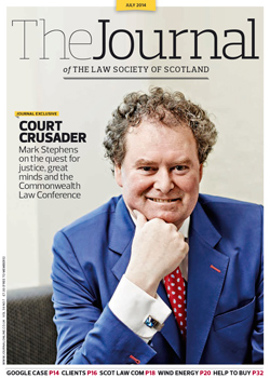Ninth life

“I think that somewhere beneath the skin of every practising lawyer, there does beat the heart of a law reformer.” From his early days as an advocate and now as a judge and law commissioner, Lord Pentland has always had an interest in law reform.
The Scottish Law Commission will enter a new era of law reform as it marks its 50th anniversary next year, and its newly appointed chairman, Lord Pentland, is encouraging legal practitioners to contribute suggestions for areas of the law requiring modernisation or improvement in order to ensure that Scots law and practice matches, or exceeds, the best global standards.
As the Courts Reform (Scotland) Bill and Criminal Justice (Scotland) Bill progress through the Scottish Parliament, bringing fundamental changes to the civil and criminal justice systems, the Commission has launched a consultation inviting suggestions for topics that might be suitable for its ninth programme of law reform, which it intends to begin in January 2015.
Technology led
The chairman believes the use of new technology will be key to implementing many of the proposed legislative changes, and is keen for the Commission – with its “skill and experience in carrying out systematic law reform” – to assist, where possible, in developing ideas to improve Scots law and practice.
He explains: “Perhaps the single most important over-arching area of interest, which is being actively considered by law reform agencies around the world, is the extent to which substantive law and court processes have kept pace with exceptionally rapid technological developments. The impact and influence of technology is a theme that permeates law reform work at an international level. Whether in the sphere of privacy rights, cyber-crime, freedom of information or the presentation of evidence in the courtroom, it is vital to ensure that the law does not lag behind.
“The senior members of the Scottish judiciary have taken the lead in this”, he adds. “The Lord President has made it clear that he sees a much more imaginative and creative use of IT as an essential component of civil justice reform. The Lord Justice Clerk has also said publicly that the Scottish criminal justice system is still largely conducted on Victorian lines, and he is interested in ensuring that the way criminal cases are tried in the courts takes full advantage of modern technology.
“How does the Commission fit into that? We would certainly hope to assist or complement these other strands of law reform; there may be a number of areas in which we can assist.”
In touch, but independent
Lord Pentland, who was appointed to the Commission for a five-year term in January, will spend 60% of his time there and 40% on the bench. He believes it is essential that the chairman should continue to be a serving judge: “It is very important that the Commission stays in touch with what is happening on a day-to-day basis in the courts, both civil and criminal.”
It was his experience of both, as an advocate and as a judge, coupled with an interest in reform, which attracted him to the role of commissioner. “The law is constantly evolving and one of the more interesting features of being a court lawyer is that the landscape is continuously shifting”, he explains. “Like most lawyers, one has always had an interest in law reform, and this is an exciting time for law reform in Scotland.”
The chairman hopes to draw on his experience of working with government as a minister and as a QC, as partnership working is crucial to ensuring the Commission’s proposals are taken forward, but he is clear that maintaining independence is equally important.
“Although we have statutory independence, we do not work in isolation. It has always been an issue for law reform agencies, both north and south of the border since they were created by the Law Commissions Act 1965, to find a way of maximising the chance of our recommendations actually finding their way into legislation.
“It has been a persistent challenge for law reform agencies throughout the world to link up to an appropriate degree with government while maintaining their independence. We have to ensure that we pursue an integrated approach.
“At the Scottish Law Commission, we have an excellent relationship with the Scottish Government. The Justice Secretary, Kenny MacAskill, is very supportive of the Commission and its work, and that is exactly the way we want it to be. He fully respects our independence, but at the same time has an understandable interest in ensuring that our work fits in a reasonable way with the government’s programme.”
He adds: “Putting together our new programme is a complex process of ensuring that all the different parts of the system are speaking to one another in a constructive, open and modern process of dialogue. We are a public agency and we have a responsibility to ensure, particularly in the current economic climate, that we deliver value for money.”
Practical understanding
The Commission is in the process of completing its eighth programme of reform, though a few projects will be carried over. The factors to be taken into account when assessing consultation responses for the ninth programme are the importance and suitability of the particular area of law for reform, in addition to the resources and skills the Commission has at its disposal.
The chairman explains that the Commission adopts a collegiate approach to reform. “All the policies in the Commission’s discussion papers and reports are the result of peer review by the commissioners of each other’s work – it is a collaborative process.
“We also derive a huge amount of assistance from outside persons, agencies, groups, etc, who generously give up time to contribute to our consultation exercises. On all our major projects, we have advisory groups consisting of lawyers and others with practical experience in the area, so we are drawing on their knowledge in order to develop our ideas about reform. We are a practically focused body and certainly not some remote ivory tower.
“It is vitally important that we understand what the practical problems are, and that we do our work based on a correct understanding of these. It is of the greatest importance to the public that Scots law remains up to date, particularly in a small system where the amount of case law is inevitably limited.
“Whether it’s with IT, or wider developments in the law elsewhere in the world, we want Scotland to be a safe and secure country in which to live. And we want to contribute to making Scotland an attractive country for business, investment and economic development. All that requires our law to be modern and user-friendly across the board.”
The Commission aims to take full advantage of the new procedure in the Scottish Parliament that provides for a more streamlined means of considering and implementing Commission bills.
“We have already given evidence before the new Delegated Powers & Law Reform Committee, and it is very positive about taking on law reform bills. The first of these is now going through the new process; it aims to make execution of contracts in counterpart possible and will also permit delivery of paper documents by electronic means.”
What would Lord Pentland like to have achieved in five years’ time? “I hope the Commission will have succeeded in modernising a significant amount of our law, to put it on a par with or even to exceed best international practice.”
About the chairman
Lord Pentland (Paul Cullen) was admitted to the Faculty of Advocates in 1982 and became a QC in 1995. He served as an advocate depute between 1991 and 1994 before being appointed Solicitor General for Scotland in 1995, an office he held until the 1997 general election. He then returned to practice at the bar, specialising in commercial and public law, and was made a Senator of the College of Justice in November 2008. Until he took up his position with the Commission, he was an intellectual property judge and a member of the Upper Tribunal (Tax and Chancery Chamber).
In this issue
- “The Union and the law” revisited
- Cartels: raising the stakes
- The cooling-off catch
- Attack vectors into the law: smartphones
- Money laundering: the Fourth way
- Has Glasgow morality come to Edinburgh?
- Reading for pleasure
- Opinion: Graeme McCormick
- Book reviews
- Profile
- President's column
- 10-year target
- Headline act
- Forget that you ever knew me
- The cooling-off catch (1)
- Tax devolution: the legal implications
- Ninth life
- Planning: how does the wind blow?
- Going off the rails
- Employee shares? Sort them yourself
- Angostura, anyone?
- National priorities
- Scottish Solicitors' Discipline Tribunal
- People on the move
- Heart of the action
- Helping solicitors on Help to Buy
- Conditions countdown
- Where bullocks fear to roam
- Fit to grant?
- Controlling the risks
- Ask Ash
- Opening up the law
- From the Brussels office
- Law reform roundup
- Post-corroboration Review update






